| Srl | Item |
| 1 |
ID:
066183
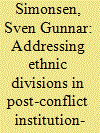

|
|
|
| 2 |
ID:
145146
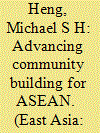

|
|
|
|
|
| Summary/Abstract |
This is a policy paper supporting the vision of ASEAN leaders in the project of ASEAN Community building. However, it goes beyond their declarations to argue for a more thorough going adoption of the norms of the United Nations and to promote more people-to-people activities and ASEAN consciousness among the people. ASEAN was established in 1967 with the aim to strengthen regional cooperation to deal with the geopolitical challenges of the Cold War. It has scored successes in the realm of economy. Driven by the dynamics of globalization, ASEAN has aspired to become a full-fledged community of nations. It aims to widen its scope to include social and cultural dimensions, social justice, and human rights. The most progressive manifestation of this is the ASEAN Charter. To advance the project of the ASEAN Community, this paper makes suggestions at two levels, namely the level of ideas and the level of activities, with some reflections on nation building. A nation at peace with itself based on social justice and human rights contributes to regional community building. If and when it does come about, the ASEAN Community will represent a new ASEAN identity, with a new moral and political order, and it will be able to articulate global issues in international forums with moral authority and moral coherence.
|
|
|
|
|
|
|
|
|
|
|
|
|
|
|
|
| 3 |
ID:
139187
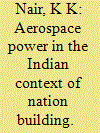

|
|
|
|
|
| Summary/Abstract |
The aim of this paper it to undertake a brief overview of the prevailing and future applications of aerospace power in providing solutions to national security objectives in the larger process of nation building. In the contemporary dynamic environment, it is essential to have a clear understanding of the attributes, limitations and potential of air power so as to enable its optimum exploitation in furthering national objectives.
|
|
|
|
|
|
|
|
|
|
|
|
|
|
|
|
| 4 |
ID:
089845
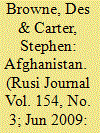

|
|
|
|
|
| Publication |
2009.
|
| Summary/Abstract |
The political questions in Afghanistan are difficult and complex. While the new US approach has much to be commended, there is still cause for alarm. Legitimacy and governance remain a massive challenge. Elections are a vital next step-but many doubt the credibility of the coming vote. Effective institution-building is threatened by an incoherent approach that does not grapple with the key issues, which are ultimately political.
|
|
|
|
|
|
|
|
|
|
|
|
|
|
|
|
| 5 |
ID:
119977
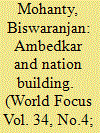

|
|
|
| 6 |
ID:
079993
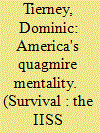

|
|
|
| 7 |
ID:
056917
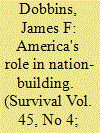

|
|
|
|
|
| Publication |
2003.
|
| Description |
p87-109
|
|
|
|
|
|
|
|
|
|
|
|
|
|
|
|
| 8 |
ID:
066505
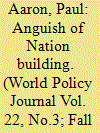

|
|
|
| 9 |
ID:
064544
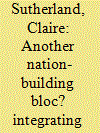

|
|
|
| 10 |
ID:
102198
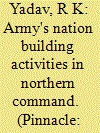

|
|
|
| 11 |
ID:
102184
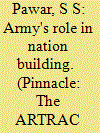

|
|
|
| 12 |
ID:
146165
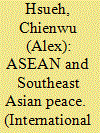

|
|
|
|
|
| Summary/Abstract |
The Southeast Asian peace literature points out at least three points of view regarding regional peace: some emphasize ASEAN's successful security management, others doubt its effectiveness, and a third body of research argues that it is achieved by a ‘capitalist peace’ trajectory. In this article, I refute the capitalist peace argument and construct a theory to bridge the two contradictory perspectives on ASEAN, arguing that the pacifying effect of ASEAN should be understood as a conditional one, which hinges on Southeast Asian countries’ economic performance. For decades, nation building and economic growth have been the main goals of Southeast Asian countries as well as the foundation to their leaders’ rule given the countries' distinct historical backgrounds. When the leaders are not able to maintain good economic performance, they tend to emphasize the nation building issues, such as provoking territorial disputes, to keep their ruling legitimacy, thus compromising ASEAN's security management. Empirical analysis of the onset of militarized interstate disputes from 1950 to 2001 confirms my argument.
|
|
|
|
|
|
|
|
|
|
|
|
|
|
|
|
| 13 |
ID:
069167
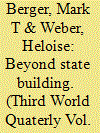

|
|
|
| 14 |
ID:
128232
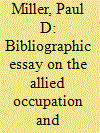

|
|
|
|
|
| Publication |
2013.
|
| Summary/Abstract |
There is no definitive, single-volume history of the Allied occupation and reconstruction of West Germany from 1945 to 1955. This is a significant and surprising lacuna in the literature on US and European history, international relations, and the rapidly growing field in reconstruction and stabilization operations. Scholars, historians, and policymakers need a comprehensive treatment of the German occupation. There is now an opportunity to fill that need. This bibliographic essay reviews the wealth of source material that has become available in recent decades. We can now synthesize primary sources and specialized scholarship to tell the story, for the first time, of how the Allies occupied and rebuilt the western part of Germany.
|
|
|
|
|
|
|
|
|
|
|
|
|
|
|
|
| 15 |
ID:
082058
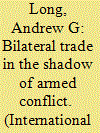

|
|
|
|
|
| Publication |
2008.
|
| Summary/Abstract |
Does the shadow of war decrease trade? I examine the influence of conflict on bilateral trade and argue that trading firms' expectations of armed conflict, both within and between nation-states, should decrease trade along with armed political violence. By assuming that firms care about future profits and assess the likelihood of a domestic or interstate conflict in the future that could disrupt trade, I argue that increasing the expectation of a domestic or interstate conflict raises the transportation, transaction, and production costs of trade. Empirically, contemporaneous trade levels should be negatively related to trading firms' beliefs about the likelihood of domestic and interstate conflicts in the future. Statistical tests, using bilateral trade data from 1984 to 1997, show that expectations of domestic or interstate conflict, in addition to violent armed conflicts, are negatively correlated with bilateral trade levels. Theoretically and empirically, this research advances our understanding of the trade-conflict relationship by demonstrating how trading firms' expectations about future conflict reduce bilateral trade levels
|
|
|
|
|
|
|
|
|
|
|
|
|
|
|
|
| 16 |
ID:
086834
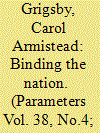

|
|
|
|
|
| Publication |
2009.
|
| Summary/Abstract |
The United States has been at war for more than seven years, and the end to its struggle against religious extremism is nohere in sight. Thus far the majority of the campaign has been waged by the military. With the prolonged counterinsurgencies in Afghanistan and Iraq has come a growing realization that more alienated youth could appear on the world's battlefields unless the united States begins to win more descisively the war of ideas.
|
|
|
|
|
|
|
|
|
|
|
|
|
|
|
|
| 17 |
ID:
102193


|
|
|
| 18 |
ID:
083051
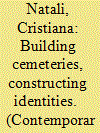

|
|
|
|
|
| Publication |
2008.
|
| Summary/Abstract |
The present paper explores the importance of new burial practices within the process of nation-building in the Sri Lankan territories controlled by the Liberation Tigers of Tamil Eelam (LTTE). In particular, the paper focuses on the perception that Tamil people, both civilians and fighters, seem to have of the Tigers' cemeteries as symbolic centres of Tamil Eelam, the new separate state claimed by the LTTE. This article analyses the reasons that have led to this perception. On the one hand, it discusses the functional analogies between the LTTE cemeteries and the war graveyards belonging to military western traditions. On the other hand, it emphasizes the peculiarity of the LTTE cemeteries of being perceived as holy places. The Tigers' cemeteries are called Tuilum Illam, literally in Tamil 'Sleeping Houses', and are often described as temples. The paper offers an explanation why the LTTE, in spite of their asserted secular nature, have decided not to reject this religious interpretation; namely, because it allows them to include the Tuilum Illam in the mainstream of Hindu tradition. In this context, the ability to integrate the religious dimension represents a crucial component in the process of nation-building. This article draws upon the findings of fieldwork carried out since July 2002, especially in the northeastern regions of Sri Lanka controlled by the LTTE.
|
|
|
|
|
|
|
|
|
|
|
|
|
|
|
|
| 19 |
ID:
051418
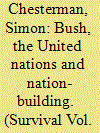

|
|
|
|
|
| Publication |
2004.
|
| Description |
p101-116
|
| Summary/Abstract |
Would greater UN involvement have avoided any of the mistakes made by the Coalition Provisional Authority (CPA) in administering Iraq? Three of the most egregious errors – failing to provide for emergency law and order, disbanding the Iraqi army and blanket de-Ba'athification – ran counter to lessons from previous operations. But the greatest mistake by US planners may have been the assumption that previous UN nation-building efforts have achieved limited success because of UN incompetence, rather than because of the inherent contradictions in building democracy through foreign military intervention. The United States is now engaged, in Afghanistan and Iraq, in two of the most ambitious nation-building projects in its history. The US took a predominant role in part because of the circumstances in which the two conflicts commenced, but also as an extension of the present administration's more general suspicion of multilateral institutions such as the United Nations. This suspicion now undermines the chances of either operation concluding successfully.
|
|
|
|
|
|
|
|
|
|
|
|
|
|
|
|
| 20 |
ID:
069157
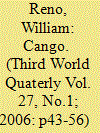

|
|
|